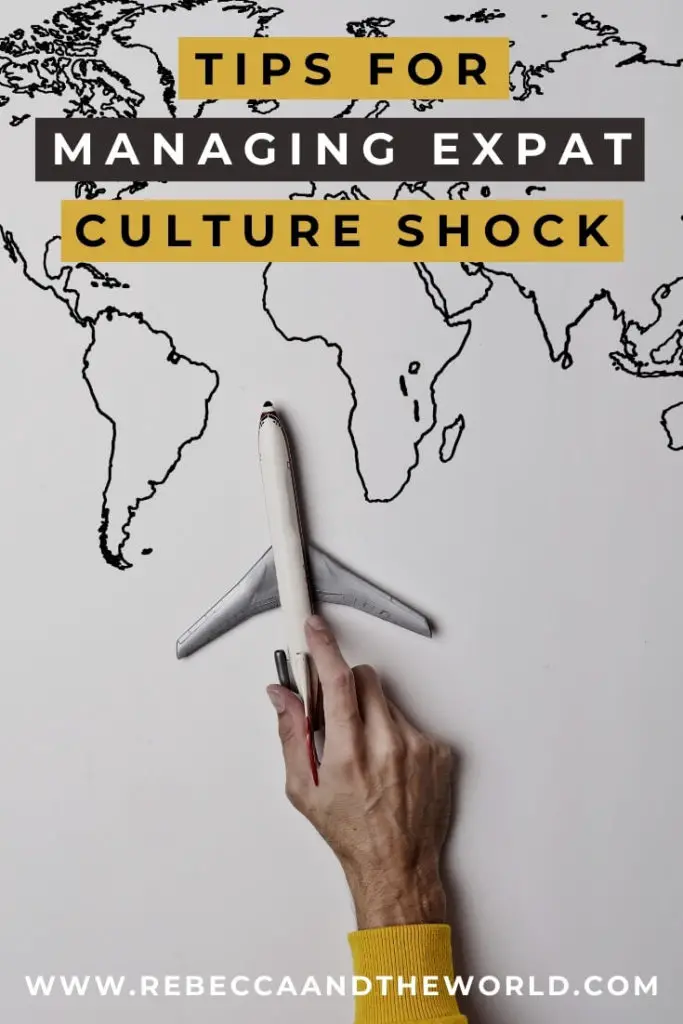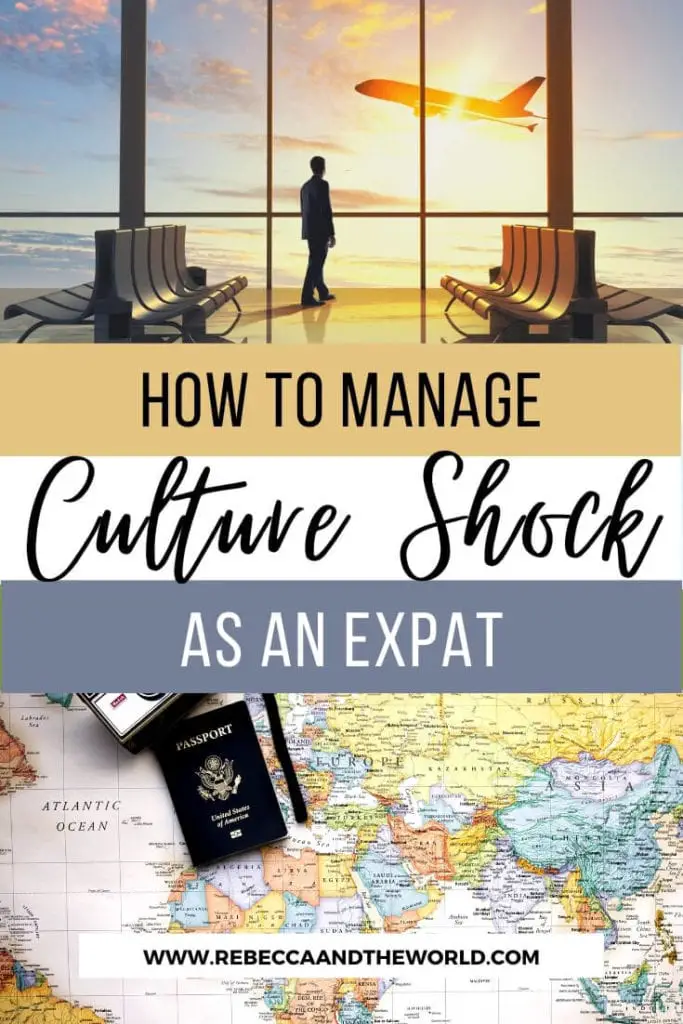Living and working abroad may be something you have always wanted to do, and when you look back on your time as an expat, it could well prove to be a highlight of your life. But when you first move, expat culture shock can often make things difficult.
Trust me, I know. Having now lived in three countries that aren’t my own, I’ve experienced some form of culture of shock every single time I’ve moved. For this reason, I’ve teamed up with Allianz Care to bring you some information on culture shock and tips to manage it.
Want to save this guide to dealing with expat culture shock so you can read it later? Just click the “Save” button on one of the images below to save it to Pinterest.
What is culture shock?
We use the term “culture shock” so flippantly in the modern world, it’s easy to forget it is a recognised psychological difficulty suffered by many who find themselves in an unfamiliar place. Canadian anthropologist Kalervo Oberg defined culture shock as “an occupational disease of people who have been suddenly transplanted abroad. Like most ailments, it has its own symptoms, cause and cure.”
What are the stages of culture shock?
Like many psychological conditions, culture shock usually involves several phases. Some people experience these phases in a linear way when moving abroad. For others, the order and timeframe can vary. Regardless of how and when you experience culture shock, you can take steps to help alleviate its effect and it will pass.
For most expats, there are four stages of culture shock:
- The honeymoon stage
- The frustration stage
- The adjustment stage
- The acceptance stage
Let’s explore each of these stages of expat culture shock in more detail.
1. The honeymoon period
This stage usually occurs at the beginning of expat living, when everything is new and exciting and you believe making the move to work abroad was the best decision you ever made. Chances are you’re getting up to speed with your new role and you’re out every weekend playing tourist, trying all the new foods or maybe even learning a new language. This period can last days, weeks or even months.
2. The frustration stage
If you have experience travelling to other countries on holiday, you may have experienced this frustration stage to some degree. It usually begins with something small, like not being able to find a place, understand someone or figure out public transport, but it can escalate as you sort out the practicalities like enrolling your child in school or interacting with government agencies.
For example, dealing with bureaucracy in Argentina – and in another language! – was when we felt this the most. Trying to figure out how to get something repaired or not being able to find something as simple as peanut butter in the supermarkets was unimportant in the grand scheme of things, but frustrating for us nonetheless.
During this period, you may feel homesick for the first time and you may have a longing to return to the comfort and familiarity of your own country. You may also experience expat depression during this time.
3. The adjustment stage
The best thing about the frustration stage is it rarely lasts long. In time you’re likely to feel more comfortable with your new environment. This is the adjustment stage.
It might start off small, like successfully ordering dinner at a restaurant in the local language. As the weeks and months go on, you might find yourself having an entire conversation with a client or someone at work in the local language. During this stage, you begin to adapt to your new culture, whether that means bringing snacks for a long queue or leaving early for punctual public transport. Generally, the things that used to annoy you don’t bother you as much.
4. The acceptance stage
Finally, months or years after moving you may reach the acceptance stage where you feel comfortable in your new environment. It doesn’t mean you agree with how things work in your new home, but you have found ways of adapting and realise you don’t need to understand everything in order to work and live there successfully.
Tips for avoiding culture shock
Although culture shock is a process, it can be challenging at a time when you have a lot of other things to deal with. There are things you can do to avoid the feelings associated with culture shock.
Before you go
Before heading off on the exciting new expat adventure, take some time to get to know the stages of culture shock. There are two ways in which this is thought to help. Firstly, it is thought prediction, or knowing what lies ahead, plays an important part in the reduction of stress. Secondly, being aware of a potential problem enables us to figure out solutions.
If you haven’t left for your expat assignment or moved to your new country yet you’re ahead of the curve, and have time to research and think ahead.
Research your new culture: read as much as you can, ask questions in expat or related forums (there are so many groups on Facebook, for example), not just the easy topics but the more detailed cultural elements that will impact day-to-day life like:
- How do people greet each other?
- How you should dress?
- What’s the usual meal schedule?
- What physical contact is or isn’t acceptable in public?
Understanding information like this before you leave will help prevent unintentional mistakes when you get to your destination.
When you get there
When you land in your new country, do as much as you can to be optimistic. Tell yourself you’re going to enjoy the experience and will take it one day at a time. This has shown to have a positive impact while you settle in to life abroad.
Learn to accept your new culture. Even if there are elements of it that you struggle with, try not to measure them against your own. Don’t constantly compare customs and situations to what you’re used to; instead, accept the cultural differences and do what you can to adapt and embrace them. Enjoy learning these new traditions and customs!
Build a social network. Studies have shown that having friends to lean on in times of stress can help you cope significantly better than those who don’t. As a relatively new expat, you may not have a social network in your new home. If this is the case, try to stay in touch with friends and family in your home country to talk about how you’re feeling. Once you’re comfortable, start reaching out to expat groups or make local friends through work or by taking up a new hobby.
Expat living can be challenging at times, but with preparation and optimism it’s often a career and life highlight. If you do need extra support while settling in, make sure your international health insurance plan includes an expat assistance program so you have access to professional help, should you need it.
This post was made possible with the support of Allianz Care, which specialises in international health insurance for expats.
EXPAT LIFE – TIPS FOR BECOMING AN EXPAT
Looking for more advice on becoming an expat? Check out the other articles I’ve written:
- Surviving expat life: Top tips for new expats
- How to manage your expat finances
- How to settle into a new country as an expat
- Tips for surviving Christmas abroad as an expat
- Read about other expats’ exciting experiences – from Papua New Guinea to Argentina to the USA – in my Expat Tales series
Have you ever experienced expat culture shock? How did you cope? Let me know in the comments below.
This post was originally published in December 2018, and was updated in August 2020.







